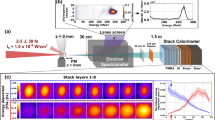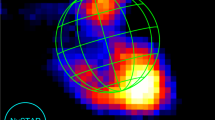Abstract
IT has been shown in a previous paper1 that the major part of the electron showers produced in a lead plate are formed by a 'cascade process' in accordance with the shower theory proposed by Bhabha and Heitler2 and Carlson and Oppenheimer3. Our experiments have been made with an automatic cloud chamber. Four lead plates of 3 cm. thickness are placed inside the chamber in a distance of 5 cm. A cloud chamber divided up in this way offers good opportunity of studying the way in which the showers are generally produced.
This is a preview of subscription content, access via your institution
Access options
Subscribe to this journal
Receive 51 print issues and online access
$199.00 per year
only $3.90 per issue
Buy this article
- Purchase on Springer Link
- Instant access to full article PDF
Prices may be subject to local taxes which are calculated during checkout
Similar content being viewed by others
References
Trumpy, B., Det. Kgl. N.V.S. Forh., 10, nr. 37 (1937).
Bhabha and Heitler, Proc. Roy. Soc., A, 159, 432 (1937).
Carlson and Oppenheimer, Phys. Rev., 51, 220 (1937).
Author information
Authors and Affiliations
Rights and permissions
About this article
Cite this article
TRUMPY, B. Secondary Effects of the Hard and Soft Components of Cosmic Rays. Nature 141, 909–910 (1938). https://doi.org/10.1038/141909a0
Issue Date:
DOI: https://doi.org/10.1038/141909a0
Comments
By submitting a comment you agree to abide by our Terms and Community Guidelines. If you find something abusive or that does not comply with our terms or guidelines please flag it as inappropriate.



